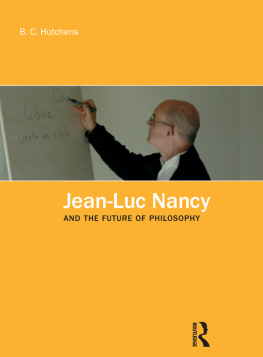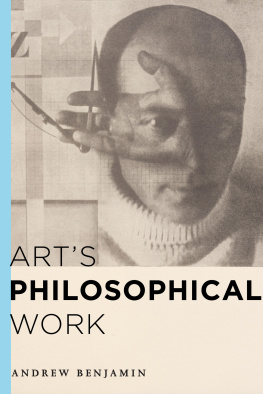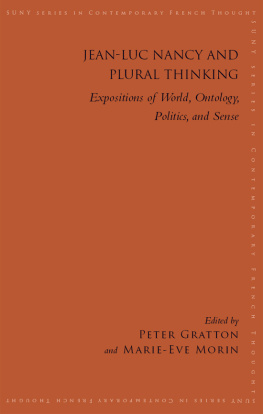Hutchens Benjamin C. - Jean-Luc Nancy and the Future of Philosophy
Here you can read online Hutchens Benjamin C. - Jean-Luc Nancy and the Future of Philosophy full text of the book (entire story) in english for free. Download pdf and epub, get meaning, cover and reviews about this ebook. City: London, year: 2016, publisher: Taylor and Francis;Routledge, genre: Religion. Description of the work, (preface) as well as reviews are available. Best literature library LitArk.com created for fans of good reading and offers a wide selection of genres:
Romance novel
Science fiction
Adventure
Detective
Science
History
Home and family
Prose
Art
Politics
Computer
Non-fiction
Religion
Business
Children
Humor
Choose a favorite category and find really read worthwhile books. Enjoy immersion in the world of imagination, feel the emotions of the characters or learn something new for yourself, make an fascinating discovery.
- Book:Jean-Luc Nancy and the Future of Philosophy
- Author:
- Publisher:Taylor and Francis;Routledge
- Genre:
- Year:2016
- City:London
- Rating:5 / 5
- Favourites:Add to favourites
- Your mark:
- 100
- 1
- 2
- 3
- 4
- 5
Jean-Luc Nancy and the Future of Philosophy: summary, description and annotation
We offer to read an annotation, description, summary or preface (depends on what the author of the book "Jean-Luc Nancy and the Future of Philosophy" wrote himself). If you haven't found the necessary information about the book — write in the comments, we will try to find it.
Jean-Luc Nancy and the Future of Philosophy — read online for free the complete book (whole text) full work
Below is the text of the book, divided by pages. System saving the place of the last page read, allows you to conveniently read the book "Jean-Luc Nancy and the Future of Philosophy" online for free, without having to search again every time where you left off. Put a bookmark, and you can go to the page where you finished reading at any time.
Font size:
Interval:
Bookmark:
Jean-Luc Nancy
and the Future of Philosophy
Jean-Luc Nancy and the
Future of Philosophy
B. C. Hutchens

Contents
Abbreviations
| BC | Of Being in Common (1991). |
| BP | The Birth to Presence (1993). |
| BSP | Being Singular Plural (2000). |
| C | La Comparution/The Compearance (1992). |
| CMM | La cration du monde ou la mondialisation (2002). |
| DC | La Dconstruction du christianisme (1998). |
| EF | The Experience of Freedom (1993). |
| FT | A Finite Thinking (2003). |
| GT | The Gravity of Thought (1997). |
| HRN | Hegel: The Restlessness of the Negative (2002). |
| IC | The Inoperative Community (1991). |
| L | LIntrus (2002). |
| LA | The Literary Absolute: The Theory of Literature in German Romanticism (1988). |
| M | The Muses (1996). |
| MMT | An Interview with Jean-Luc Nancy, M. Gaillot (ed.) (1998). |
| NM | The Nazi Myth (1990). |
| OP | Loubli de la philosophie (1986). |
| P | Is Everything Political? (A Brief Remark) (2002). |
| R | Responding for Existence (1999). |
| RP | Retreating the Political (1997). |
| SDC | The Self-Deconstruction of Christianity: A Discussion with Jean-Luc Nancy (2000). |
| SR | The Speculative Remark (One of Hegels Bon Mots) (2001). |
| SV | Sharing Voices (1990). |
| SW | The Sense of the World (1997). |
| TL | The Title of the Letter: A Reading of Lacan (1992). |
parallel lines meet at infinity, an infinity that must be truly vast to accommodate so many things, dimensions, lines straight and curved and intersecting, the trams that go up these tracks and the passengers inside the trams, the light in the eyes of every passenger, the echo of words, the inaudible friction of thoughts
Jos Saramago
Jean-Luc Nancy is Professor of Philosophy at the University of Strasbourg, co-founder of the former Centre for Philosophical Research on the Political and author of numerous influential books about meaning, freedom, community, art and politics. However, he is not merely another academic celebrity seduced by the allures of pedantry. His ideas not only bear on social realities; they also stem from them. For approximately a decade, he has endured the suffering of both a heart transplant and cancer, and written profoundly about both in such works as The Heart of Things and LIntrus. It is from Nancy that we learn that, if each part of a body could take over or spread over the body itself, then there is no such thing as body at all, only a sharing out of bodies and their relations (BP: 207). His misfortunes have inspired a relentless enquiry into the meaning of the bodys fragility and fragmentation, the tenuous connections of a community of such bodies, and the plurality of voices that express their sense. The single heart of all things, their sense, he writes, never stops coming into presence, and putting us in its presence, the presence of this concretion of being, always unique and always whatever (BP: 188). Clearly, not even the grievance against human finitude that he could so naturally possess has forced him to lose his spirited fascination with the incertitude and undecidability of discourses that incessantly fail to acquiesce in comprehension. One can only admire the fortitude of a thinker whose thoughts are not swayed by misfortune, but encouraged, deepened and even vindicated by it. Perhaps not since Pascal has a thinkers pained musing been more stirringly apt to the human condition.
Jean-Luc Nancy and the Future of Philosophy is a book addressing what this philosopher has written about the future of philosophy and the concept of the future. It surveys Nancys timely insights about the unstable conditions under which existence is always endured and fleetingly understood. Philosophical thoughts are master only of those domains they imagine for themselves; they are as vulnerable to the exigencies of a coming future as all human bodies are. It is with that in mind that Nancy writes of the corpus of philosophy, the catalogue of the ways that bodies have sense only because sense itself is bound to corporeal states and activities open to their own improvidence. Just as philosophy is troubled by the coming of sense, so are bodies in contiguity with and invaded by strangenesses that never cease being a disturbance and a perturbation of intimacy (L: 2). There is something foreign in us all, and in this respect we are each equally exposed to our shared strangeness. When the invader exposes bodies strangeness to themselves, then the philosopher is exposed to what Jos Saramago calls the inaudible friction of thoughts (see epigraph). But if there are only bodies, then every reader of this corpus should recognize the sharing in the community of bodies this necessarily brings to presence. Despite the cacophony of voices in which we philosophers share, we are nonetheless answerable to this inaudible friction between our thoughts of what is to come for our bodies and what we represent our bodies to be.
It is appropriate, then, to dedicate this book in gratitude to Jean-Luc Nancy himself. It is as much about the man as it is the stimulations his ideas have undoubtedly provided to appreciative readers.
In this book, it has been my objective to survey the relevance of Nancys expansive vision to many contemporary philosophical concerns, all of which relate to the question of the future of our time and the status of the concept of the future today. I have chosen to present Nancys critiques of various prevailing contemporary presuppositions: in particular, the substantialist, transcendentalist and immanentist metaphysics are discernible in the context of libertarianism, post-secular theology, communitarianism, contractarianism and specific, timely questions about technology and globalization. There are gaping holes in coverage, some of which are scandalous: literature, the visual arts, love, joy, and justice are some of the concepts that figure only glimmeringly in this book, if they figure at all. Nancys voluminous work on the visual arts alone would require an independent study I must confess would be beyond my abilities. Nevertheless, I hope that the reader will find what follows to be at least a suitable primer for the study of this fascinating contemporary thinker.
Next pageFont size:
Interval:
Bookmark:
Similar books «Jean-Luc Nancy and the Future of Philosophy»
Look at similar books to Jean-Luc Nancy and the Future of Philosophy. We have selected literature similar in name and meaning in the hope of providing readers with more options to find new, interesting, not yet read works.
Discussion, reviews of the book Jean-Luc Nancy and the Future of Philosophy and just readers' own opinions. Leave your comments, write what you think about the work, its meaning or the main characters. Specify what exactly you liked and what you didn't like, and why you think so.






